Last month I saw Mad Max: Fury Road (and posted a review here).
It got me to thinking about narrative structure. Even as I was watching it I could see the moments of Joseph Campbell’s Monomyth, The Hero’s Journey, in the plot.
Miller has spoken before about how Mad Max’s success was international because it had the ability to tap into a wide variety of existing cultural mythologies. Through this he discovered Joseph Campbell’s theories of the monomyth and these were significant in his development from that point on as a story-teller, and significant in the development of Mad Max 2: The Road Warrior.
In Australia, Max was the bushranger, the anti-authoritarian, standing up for the under-dogs.
In the US Max was the familiar cowboy frontiersman, Master-Blaster and his enemies were the ‘Injins’ in the same savage way of so many 1950s Hollywood Westerns.
In Japan, Max was a Ronin, a fallen samurai without a home, fighting for the honourable cause in a dishonourable world.
In this way Max was different things to different people, but at his core he was a familiar figure. A wayward loner. Lost. Wandering. Like Odysseus cast adrift on cruel seas, the victim of capricious fates.
So I applied the structure of the monomyth to Mad Max: Fury Road. It is a good fit.
Spoilers in the image below
(Click the image to enlarge)
This shows us how a writer can do new things with familiar structures. Miller has used universal themes, characters and plot structure, but created something which is being hailed as a new and groundbreaking moment in action film-making, and a refreshingly fresh take on many of the tropes and expectations in the familiar post-apocalypse milieu.
Indeed, as Leah Schnelbach wrote for Tor.com, Mad Max: Fury Road subverts many of these heroic tropes and conventions.
So let’s unpack Miller’s use of convention and subversion a little (be warned, if you proceed, I do so at some length, and with every spoiler I can summon to mind):
The Opening
Max is alone, a wanderer in the desert. The film opens with his voice-over narrative. He tells us of his world: “Fire and Blood”. He is connected to his past (by the Interceptor and his Jacket, and by his memories, his PTSD, his ‘madness’). Quickly he is caught, captured, robbed of his identity and reduced to a ‘blood bag’. Immortan Joe (and his war-boys) treat Max as an object, as a resource. This is to become a major theme.
As with the previous films Mad Max films, Max is anonymous to those he helps, and to those he opposes.
The call to adventure
In Campbell’s monomyth structure the hero is called to adventure. Often the hero resists this call, intitally, only to be convinced, or later decide, to accept the call. Here, Max is not so much called to adventure, as dragged to it. Having been taken by Immortan Joe he has been reduced to a body, even further in fact, to a mere bodily fluid. Like The Wives we are yet to meet, and like the Milk Mothers we glimpse, Max has been made an object. He is valued not for his self, but for the bodily fluid he provides. The Wives are reduced to wombs. The Milk Mothers are reduced to their breast-milk. Max is reduced to a ‘blood bag’. This is a central theme of the film, and Kameron Hurley writes well about how Joe controls the means of production in a post-apocolypse where resources are scarce.
It is not then Max who is called, but Nux and the other war boys. Nux is desperate to go on the hunt for the rogue Furiosa, desperate to prove himself, to launch himself into the promised afterlife of one who has died spectacularly in Joe’s service. He is as much reduced as the wives, the mothers, and Max. He is not a person, but an object, a weapon of war.
They are called to adventure by Furiosa’s decision. It is her agency which creates the chase which will dominate the first half of the narrative.
Max is chained, shackled, linked by blood (“Fire and Blood”) to the war-boy. In this way, strapped to the front of Nux’s car, Max’s role in the adventure begins against his will.
Supernatural Aid
As the pursuit of Furiosa and the war-rig progresses it seems that the arrayed forces of Immortan Joe’s armada will inevitably triumph. There are too many, and even on the war-rig itself Furiosa has no allies but The Wives. The dust storm toward which she steers her rig is the supernatural aid, something massive and beyond the control of any character. It forms a physical barrier to Joe’s continued pursuit, and actively destroys the last of the pursuing war-boys… the last but for Nux.
Within the moment of this supernatural aid Max wins his (still limited) freedom, overcoming one war-boy and stopping Nux’;s suicidal attempt at vainglorious sacrifice.

(Source: http://www.postmagazine.com/Publications/Post-Magazine/2015/May-1-2015/VFX-Mad-Max-Fury-Road.aspx)
When the dust settles Max is no longer linked by blood to Nux, though he is still linked by the chain. His use of the unloaded shotgun is a wonderful call-back to Mad Max 2. As coincidence or good fortune would have it, the supernatural aid leaves Max (and Nux) closest to the stalled war-rig and the opportunity it represents.
Much has been made of the scene where Max comes upon The Wives in the desert, dressed in diaphanous rags, playing under the water, but here Miller subverts the soft-porn set-up of the scene (or “the start of a Playboy shoot” as Anthony Lane suggests in the New Yorker). We see no frolicking. Unlike Lane, or David Edelstein in Vulture, I don’t think that we (or Max) are invited to view The Wives sexually. Miller is aware of that genre expectation, but The Wives are not a harem to be ogled, they are survivors of rape and slavery. Max’s interest is less prurient and more instinctual. Max has, as he said in his opening voice-over, been reduced to a single instinct: to survive. The water, and the war-rig are the means of this survival. His attitude to the women (Furiosa) especially, is one of guarded respect for the threat that they represent to his survival. He is not interested either in freeing them (they have, after all, freed themselves, both from their prisons and in discarding their chastity belts, from sexual servitude) nor saving them. When he leaves in the war-rig he is (rather unheroically) consigning them to a return to Immortan Joe. But the war-rig, by extension Furiosa, won’t allow it, and reluctantly they are all – even Nux – joined in flight.
The Threshold
Nux is still a war-boy, and still an antagonist (though a minor one). He is ejected from the war-rig before it can pass through the threshold of the known world and into the unknown. In pushing him from the rig The Wives make it clear that he symbolises a sort of toxic masculinity which they see as the cause for the preceding apocalypse. The unthinking violence, the following of orders, the delusion desire for self-destruction, the loyalty to Joe… all of these parts of Nux make him unwelcome on the war-rig, and so when he passes through the Threshold between worlds it must be as a war-boy, as part of Joe’s crew.
The mistrust between Max and Furiosa continues, and Max refuses to give her his name. She names him Fool in response, but he is no longer ‘Blood-bag’, he is more than that already, more than a mere body, or a mere bodily-fluid.
Despite this mistrust Furiosa teaches Max the kill-switch combo, and so makes him a partner in her adventure. She drives them through the Threshold between worlds, but immediately beyond that threshold it is he who remains in the war-rig while she is not, and it is he who drives them from the threshold into the unknown while the Threshold Guardians (the bikers) turn against them and Joe finds his own way through the threshold to attack.
The Unknown World
Here Max plays a role in the escape from Joe, but it is a significant subversion that he drives while Furiosa is the shooter, and that The Splendid Angharad shields both Max and Furiosa from Joe’s attacks. It is her pregnancy – the womb which is for Joe her only value – which protects them. Max is a means of their escape, but it is the women themselves who win that escape.
Nux becomes helper:
Having passed through the threshold as a member of Joe’s war band, Nux begins his transformation. He is anointed with chrome lips by Joe and sent onto the war-rig, only to immediately and embarrassingly fail. Joe’s dismissal of him is classic Australian understatement, and a crushing event for Nux which breaks down his war-boy self and leaves him vacant, for The Wives (and particularly Capable) to rebuild. As he sheds the war-paint and identity of one of Joe’s soldiers, it is through their forgiveness and acceptance that he is transformed. This is also a subversion, on the transformative nature of forgiveness, both for those who forgive and for the forgiven. This ties in thematically with Max’s inability to forgive himself, and the madness and visions that plague him as a result. This is not the action-hero paradigm of a retaliation for wrongs done. This is not bloody revenge at all costs.
As a result of his transformation Nux becomes the third driver of the war-rig, and at the scene with the tree (tree-thing) he becomes not just a helper in the physical sense, but through his ideas and his use of the chain which had once bound he and his blood-bag Max together as a crucial link in winching the war-rig to safety.
Challenges and Temptations:
The Wives’ commitment to their own freedom is challenged by the loss of The Splendid Angharad and the life growing within her. It is her own words which are then repeated, almost a mantra of motive, that they will no longer be objects. Cheedoh the Fragile in particular is tempted to return and hope for Joe’s forgiveness.
The bog becomes a physical challenge. Furiosa physically pushes at the war-rig, willing it on to higher and drier ground. The Wives and Max work with her to free the wheels from the mud, and to lay booby-traps for the armada following them.
When Max leaves the group, perhaps tempted to abandon them as he had intended to when he was first freed of his chains, Furiosa worries that he will not return. When he does it is a significant moment of bonding the group together. He is equipped now, and shares the weapons he has won. He is covered in blood, but it is not his. He bathes his face in Mother’s Milk. In his opening narration Max told us that his world was fire and blood – here the milk washes that blood away. Max’s world has been fundamentally changed.
It is in this section that we are shown a (rare) quiet moment, with Max and Furiosa together and alone – as alone as they can be on/in the crowded rig. Max – who had told us he had been reduced to a single instinct: survival – listens to Furiosa’s goal. For her, survival is not enough. She was surviving, has survived, under Immortan Joe. Her decision to depart from that life is her quest for something greater than survival. Redemption. It’s a quest Max will come to share.
The Abyss
The discovery of the Vuvalini is a false triumph. They are few, and they are – with one exception – old. They are no longer the many mothers Furiosa had hoped to find. The ‘green place’ she remembered, had promised, had become the very poisoned swamp they had passed. Her hope for her future dies, and she collapses, alone again, in the sand.
Here, things are at the lowest point. Redemption seems impossible. Max allows Furiosa to have her moment of grief, without overwhelming it with his own.
Max accepts Furiosa’s choice to leave, and elects not to follow. They are – momentarily – broken, but looking out across the salt plains Max realises that Furiosa’s goal has become his own, and he can help her achieve it. Neither can succeed alone, but together there is a chance.
He offers her the choice to return, but at no point does he order, or expect, or even persuade her. Furiosa reverts to survival and decides to cross the salt plains (the dead place of the monomyth) with no real plan any more but to keep going. The hand-shake on the salt plains is the beginning of the redemptive transformation and a return to the known world, changed and gifted.
Max and Furiosa are full-partners now, allies. Tansy Rayner Roberts writes well about Max not as feminist, but as ally, and nowhere is this better represented than while they are in the abyss.He lays out a plan, but it’s clear that she could as easily choose to keep riding across the salt and Max would go his own way, as they had been about to do.
It’s also in the abyss that they receive the gift of the goddess: the seeds. Liz Bourke posted a conversation which touched on the significance of the seeds. They are, thematically and in terms of narrative structure, the point of the return to the Citadel. Where The Splendid Angharad represented most directly – through her pregnancy – life being taken away from The Citadel, the seeds are the return of life. The unborn life was lost. The seeds are an unborn life recovered, saved, tended, nurtured, carried by the Vuvalini for precisely this opportunity, in the hope that fertile ground can be found. The Citadel is fertile ground, but corrupted by the influence of Joe. Freed of his influence, it will represent redemption.
Transformation and Atonement
It would seem that the return to the Citadel is an exact mirror of the flight from the Citadel, in that both have the war-rig at their centre and in both cases Immortan Joe and his allies are the pursuers. This is not exactly correct. Where the flight from The Citadel was a car chase, the return is a car race.
In the first instance the war-rig was the goal. If it could be stopped, or broken, the chase was finished. In the return however, The Citadel is the goal. Joe and the war-rig are not pursuer and pursued, but rival combatants. This is the first transformation.
There are also several transformations of character, but perhaps none more so than in the case of Nux. The one-time war-boy has lost his war-paint and has come to look more and more human, less the alabaster embodiment of death. Where he was sneaking around on the war-rig as a saboteur, he is now a mechanic, keeping the rig moving where he had once sought to bring it to its halt.
His atonement for his previous acts comes as the war-rig approaches the world navel, the threshold that will return them to the known world. The canyon has been cleared and repaired since their last passing and it is clear that success relies on the war-rig passing through first, and Joe’s armada being stopped on the other side, in the unknown.
It is Nux who makes this possible. He ironically achieves the fiery self-sacrifice he had been craving as a war-boy, but it is transformed from the destructive act he intended in the dust storm of the movies opening. Now his act is his own, a decision he is making, not for personal glory, but for the good of others fro whom he cares. He has changed to much to return to the world where he had been a war-boy, but he atones in a matter befitting a war-boy changed.
Cheedoh the Fragile atones for her earlier temptation by taking on the role, again, of the wife wishing to return, but this time she transforms that role into a betrayal of Joe. This allows Furiosa to climb aboard and confront Immortan Joe face to face. She takes a moment to ensure that he sees her, that he remembers her, as surely she remembers the many years in which she was his property – years which her mother could not survive – before killing him. Joe’s death was necessary for The Wives, The Citadel, and Furiosa herself to be truly free of his influence, and with that death achieved he returns to the known world dead, defeated, overthrown. Furiosa has atoned for the long years in which she was a cog in Immortan Joe’s wheels of power.
Max’s atonement is in accepting his role as ‘bloodbag’. Like Nux he embraces a role which had been imposed on him by Immortan Joe, but he twists and subverts the role to a transformed purpose. Nux subverts Joe’s preaching of a glorious death, shiny and chrome, and makes the act life-affirming. Likewise, Max takes Joe’s attempts to reduce him to a mere fluid, and transforms the act into one which is life-saving. He stabs Furiosa, but without violence, as an aid to her. He gives her his blood, and – perhaps as significantly – he gives her his name. He atones for what he once was, for the concept of masculine hero as a destroyer, and becomes heroic as a life-giver.
The Return
It is Max who reveals the body of Immortan Joe, but Furiosa who steps forward to make that revelation real,and Furiosa who is raised up, with The Wives and the survivors and the all-important seeds.
Life has been returned to The Citadel, and life uncorrupted by Joe.
The Milk Mothers are free of their shackles and step forward to release the waters for the people. They are no longer the means of production themselves, but they have assumed control of the fluid that will bring life to the parched earth and its parched people.
Max, having achieved his redemption, and aided Furiosa in hers, returns to the state in which we found him in the film’s opening: a lone wanderer in the wasteland, belonging nowhere.

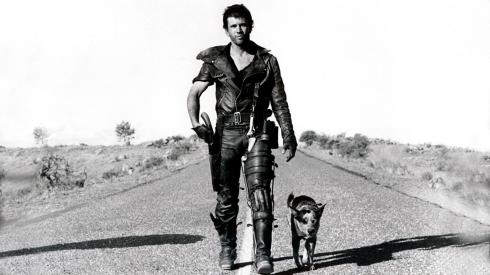
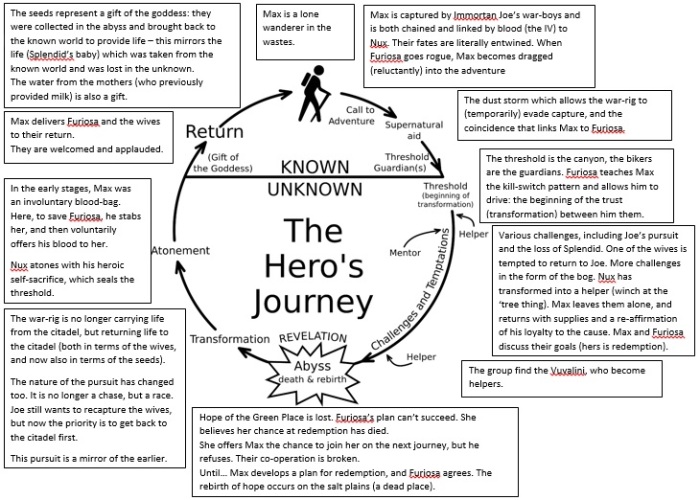
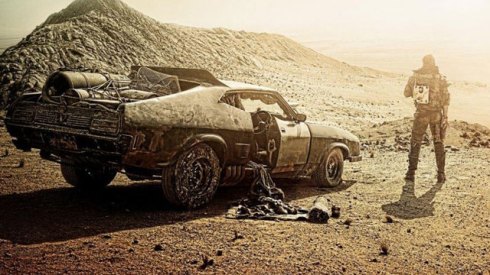
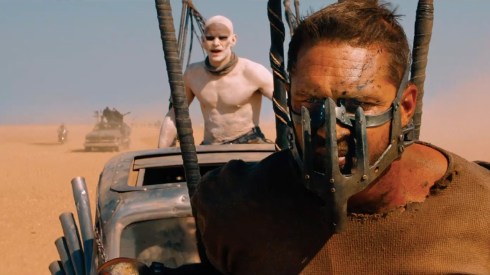


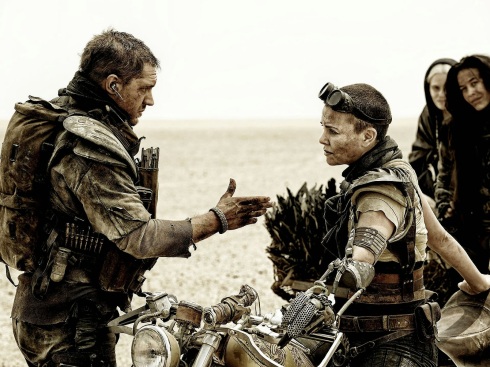
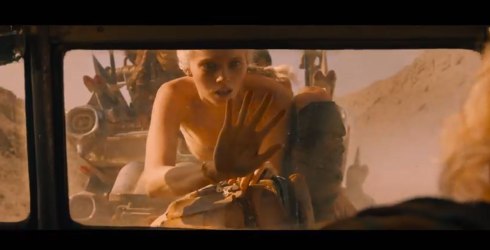
Leave a comment